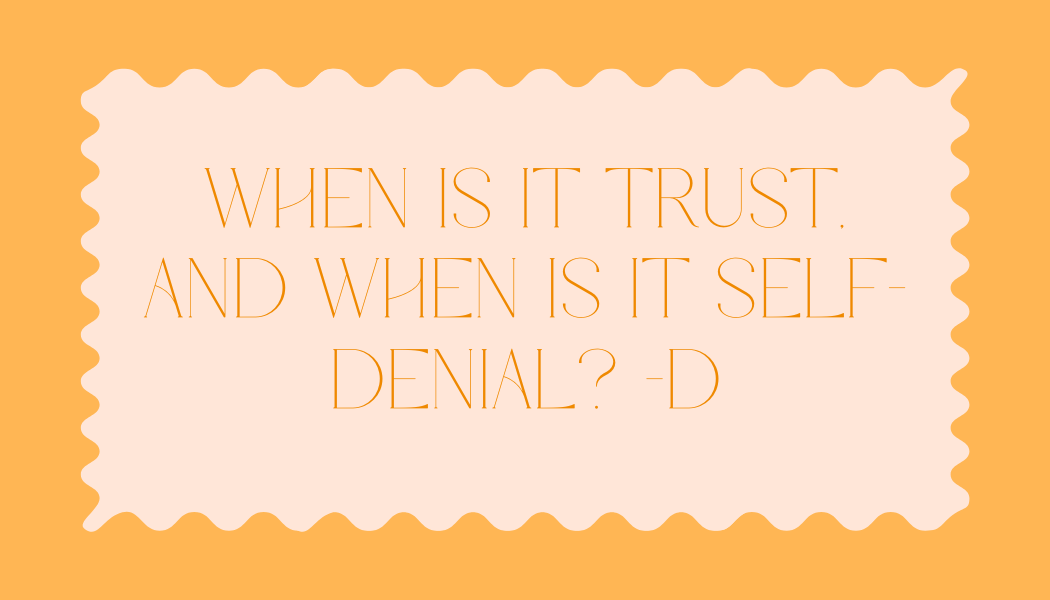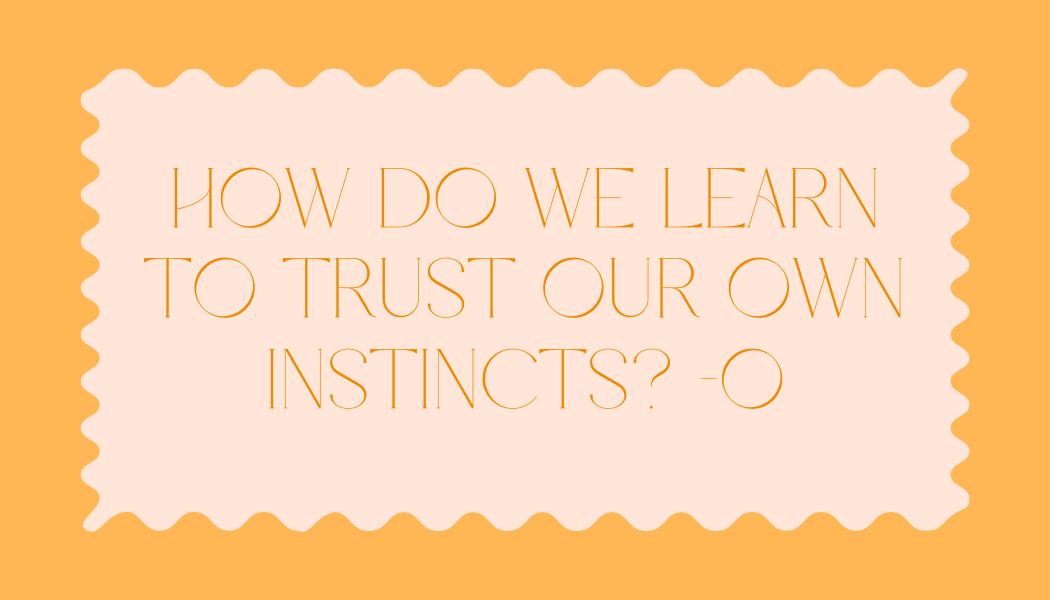Hi everyone! Welcome to a new section of this Substack (for now — let’s test it!) that I’m calling “Just Curious.” In this corner of the newsletter, we’ll do a deep dive not into entertainment — *plot twist* — but into other topics dealing with our daily lives. You ask, I find the expert to answer! This issue, Dené Logan is speaking on trust — in others and in ourselves. I’m still chugging away on the In Deep essay for February, so this is coming out in its place this weekend. I very much think it will be worth the wait. ;) In the meantime, enjoy!
Not long ago, on some weekday, an old friend and I sat on bar stools on the Upper East Side. We hadn’t seen each other since college, but since we both live in New York City, we decided to reconnect. We talked about many things, but one thing we could not stop talking about is trust. Particularly, trusting ourselves.
We exchanged stories about the years following school in our early twenties; her attending acting school in overseas, and me, fulfilling my dream of living and working in Los Angeles (which I famously came to hate…sorry!). We found ourselves regurgitating words people have said to us, both well-intentioned and ill-intentioned, that have stuck with us since.
I can still hear the childhood friend, who, when I moved to Washington D.C. for one year after school instead of moving straight to Los Angeles, told me they were disappointed that I was settling. I can still hear the family friend, who, when I announced that I was moving to LA, told me I wouldn’t last among sharks. I can still hear the colleague who told me I would regret moving away from LA, and the other who told me, “You know what they say: those who don’t do, teach” after I confided in them my dream of one day teaching.
I can still recall the bartender who laughed at me after asking what I wanted to do. The dear friends, whom, I was sure would believe my truest intentions and understand my larger reasoning after moving back east, saying, “It’s okay; you can admit that you’re moving for Dan.” I can still feel the sting from when someone I adored implied that I was “selling out” when I decided I didn’t want to do freelance work anymore (I wasn’t happy), or that I changed jobs “too” often (I was laser-focused on deciding the right career path for me more quickly), or that I would never be happy because I couldn’t even commit to one city (I was looking for the best fit). I can still hear them all. But they didn’t have the grand vision for my life. I did.
Overtime, comments like these can degrade our instincts and make us question ourselves; our intentions. I, like my friend, reflected on how glad we are that we trusted who we were and where we were going; that we made every decision with that knowing at the forefront. We may not have seen the full picture — and we still don’t — but we knew that inexplicable flicker in ourselves well enough. I remember actually thinking at some point that I was fucked up and broken because of the very things people who I trusted told me. But I wasn’t. And I’m not. I was following my instinct. I was trusting myself.
So trust. When is it trust, and when is it self-denial? Is trust possible after a toxic ex, family member, or friend? How do we learn to trust our own instincts? I’m taking notes from Dené Logan — author of Sovereign Love: A Guide to Healing Relationships by Reclaiming the Masculine and Feminine Within, and co-host of the Cheaper Than Therapy — who’s giving us a permission slip to reimagine the way we think about trust and instinct.
Logan: I think our work is always to focus on building the muscle of trusting ourselves. Because any other human being will always be the variable that will be outside of our control. People will let us down. People will fall short of who they (despite their best intentions) truly want to be. But trusting ourselves comes from knowing that we will be okay no matter what anyone else decides. We can do this by reminding ourselves of how we’ve navigated taking care of ourselves through challenging moments in the past, or playing the tape through on what we would do if someone hurts or disappoints us again. This can make it feel a little bit safer to let people in, knowing that we can always trust in ourselves.
Logan: I believe that it is always our work to come back to the space of trust in the larger unfolding of our life’s trajectory. We’ve been conditioned to believe there’s a ‘right’ or a ‘wrong’ way to do life. I don’t believe that’s true. This is a life school and everything we experience — even the missteps — are part of our Soul’s larger curriculum, teaching us what we need to understand to become who we’re meant to become.
What we could conceivably look at as ‘self-denial,’ I prefer to see as us still in the process of working it out. Self-denial as a detour on the path of trust. After all, there’s no rush to arrive at a final destination that we’ve predetermined in our minds. Instead, when we focus on holding ourselves with a sense of compassion, and we trust that we’ll arrive when it’s time, we can move through our emotions without as much resistance.
Logan: I don’t really like to think of these things as ‘good’ or ‘bad’, so much as information about the defense mechanisms (and really, survival strategies) we’ve adapted in an attempt to keep ourselves safe. Thinking of these strategies as ‘bad’ tends to elicit a sense of shame or make us feel that there’s something wrong with us. When in reality, we normally bring the focus back to ourselves as a defense mechanism when we got messaging early on in our lives that allowing ourselves to be seen was unsafe.
Logan: Our bodies store all of the suppressed emotions we’re not feeling or that we’ve been conditioned to talk ourselves out of. This is actually a really good thing, because our mind can rationalize our way into anything — a lot of times things that are out of alignment with the truth of who we are and the lives we want to be living. But our body will not allow for this. All of the unprocessed traumas, pain points, or minimization of our deeper truths gets stored in the body and will eventually come to the surface through illness or physical pain as a reminder to us that there are feelings and sensations that our mind needs to acknowledge.
Logan: Trusting in our instincts comes from giving ourselves permission to get things wrong and keep moving forward. When I think about instincts, I tend to think of it in terms of our intuition because that’s really what we’re talking about more than an instinctual response. Our intuition is the space of our inner knowing, and we are almost always aware of what is true about a situation. But because so many of us are conditioned to question ourselves and believe that the worst thing we can do is make a mistake, we worry that we’ll be rejected, shamed, or in trouble if we get it wrong. This is where it can be helpful to put in place a practice of radical self-forgiveness if/when we are wrong about something. But also paying attention to when our initial gut response about something was right — and where/why we talked ourselves out of it.
As always, thanks for being here. I don’t know about you, but I feel so relieved — and more powerful — knowing that trusting your instincts is a lifelong journey, not a destination. Detours happen! It doesn’t mean you’re broken; it means you’re human. See you later this month.
Hi there! My name is Mia Brabham Nolan and I’m a writer by day and by night, currently living in New York City. I write In Deep with Mia Brabham Nolan, the entertainment, music, and culture Substack newsletter. I’m on Instagram @yourstrulymia. Leave a comment with your thoughts or saying hi and I’ll always respond. Thanks for reading :)










